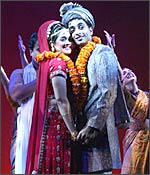 | « Back to article | Print this article |
Steven Pimlott, the director of Bombay Dreams, the first musical of its kind to open on London's West End and then on New York's Broadway, died last week at his home in Essex, England.
Pimlott, a burly man with an infectious laughter, died of lung cancer at age 53, his agent Harriet Cruickshank told the media. Pimlott had never smoked in his life. The cancer had gone into remission for a year but returned a few weeks ago.
Pimlott was expected to direct the new version of Bombay Dreams to be produced by Andrew Lloyd Webber who had shown an interest in signing Bollywood actress and recent winner of Celebrity Big Brother reality series, Shilpa Shetty.
The first version of Bombay Dreams based on Mira Sayal's book became a smash hit in London, bringing rave reviews for its composer A R Rahman, with one critic proclaiming that the Indian had 'smashed the monopoly' of American composers on the London stage.
A shocked Lloyd-Webber told the British media that he was 'devastated' by Pimlott's death. The producer had been in talks with Pimlott just a few days ago for directing one or two shows, apart from Bombay Dreams.
 Just last month, Pimlott was named Order of the British Empire (OBE) for his contribution to theatre, by Queen Elizabeth II. He had directed many Shakespearean plays for the Royal Shakespeare Company in London as well as the popular musical, Joseph and the Amazing Technicolor Dreamboat for Lloyd Webber. The popularity of the pop biblical musical in London and New York prompted Lloyd-Webber to sign Pimlott for Bombay Dreams.
Just last month, Pimlott was named Order of the British Empire (OBE) for his contribution to theatre, by Queen Elizabeth II. He had directed many Shakespearean plays for the Royal Shakespeare Company in London as well as the popular musical, Joseph and the Amazing Technicolor Dreamboat for Lloyd Webber. The popularity of the pop biblical musical in London and New York prompted Lloyd-Webber to sign Pimlott for Bombay Dreams.
Though there was apprehension from various quarters of the Bombay Dreams' reception in London and New York, Pimlott was not worried.
He had told rediff.com in New York after the show ran for 10 months that watching many Bollywood films had prepared him the show. "I had a wonderful team to help me along. I had felt by the time I stared working on it I was part of Bollywood," the deceased director was quoted as saying.
Having seen many Bollywood films, he said he had concluded that the writers and directors in India "had a firm sense of morality."
"The good people were often rewarded in the end, and the bad punished," he had said. "That is something missing in today's films in the West."
"Theatre has always celebrated stories set abroad," he had said. "Look at King and I (set in Thailand), Cabaret (Germany) and Fiddler on the Roof (Russia). Now it is the turn of Bombay. And then this musical is not about anything strange. It is still a show about idealism, young and innocent people, the lure of big city, and the courage of ordinary people. Now, who would not be moved by it?"
His unique way of working -- the way he cared for the production and deferred to suggestions -- had garnered admiration from Rahman to choreographer Farah Khan.
For instance, the London version had the Bollywood-aspiration Akash dreamily addressing the audience that one day he would love to be in the class of artists such as Dilip Kumar and Meena Kumari.
Sayal remembered later that there was apprehension that most of the audiences won't get the reference, but Pimlott said if the writer thought it was important it would have to stay.
"They (the viewers) could do some research and find out more about Bollywood icons," he had said with a hearty laugh.